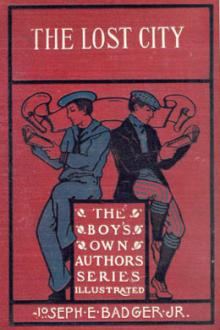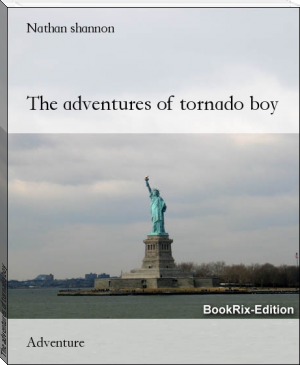The Lost City - Jr. Joseph E. Badger (children's books read aloud txt) 📗

- Author: Jr. Joseph E. Badger
- Performer: -
Book online «The Lost City - Jr. Joseph E. Badger (children's books read aloud txt) 📗». Author Jr. Joseph E. Badger
laddy-buck, in case he tries to come any of his didoes. And, at
the same time, we can be hugging up to him just as sweetly as
though we knew he was on the dead level. Understand?”
Possibly the programme might have been a little more elegantly
expressed, but Waldo, as a rule, cared more for substance than
form, and his speech possessed one merit, that of perspicuity.
Having reached this fair understanding, the brothers dropped
their aside, and moved nearer the young Aztec.
Ixtli gazed keenly into first one face, then the other, plainly
enough endeavouring to read the truth as might be expressed
therein, as related to himself. What he saw must have proved
fairly satisfactory, since he gave another bright smile, then
spoke in really musical tones:
“Good,—brother, now! That more good, too!”
In spite of the suspicions, which seem inborn where people of the
red race are concerned, both Bruno and Waldo felt more and more
drawn towards this remarkable specimen of a still more remarkable
tribe; and not many more minutes had sped by ere the younger
couple were chatting together in amicable fashion, although
finding some little difficulty in Ixtli’s rather limited
vocabulary.
Not a little to his elder brother’s impatience, Waldo apparently
took a deeper interest in the recent adventure than in the
subject which claimed his own busiest thoughts, but he hardly
cared to crowd the youngster, lest he make matters even worse.
Aided by the sort of freemasonry which naturally exists between
lads of an adventurous nature, Waldo readily succeeded in picking
up considerable information from the Aztec, even before broaching
that all-important matter.
Ixtli was the only son of a famed warrior and chieftain of the
Aztecan clans, by name Aztotl, or the Red Heron. He, in common
with so many of his people, had witnessed the approach and abrupt
departure of the strange bird in the air, and had hastened forth
in quest of the monster.
He failed to see aught more of the strange creature, but,
disliking to return home without something to show for the trip,
remained out over night, then chanced to fairly stumble into the
way of a mighty grizzly.
There were a few moments during which he might possibly have
escaped through headlong flight, but he was too proud for that,
and but for the timely arrival and prompt action on the part of
his white brothers would almost certainly have paid the penalty
with his life.
Then followed more thanks and broken expressions of gratitude,
all of which Waldo magnanimously waved aside as wholly
unnecessary.
“Don’t work up a sweat for a little thing like that, old man. Of
course we saw you were an Injun and—ahem! I mean, how in time
did you happen to catch hold of our lingo so mighty pat,
laddy-buck?”
“My brother means to ask who taught you to speak as we do,
Ixtli?” amended Bruno, catching at the wished-for opportunity now
it offered.
“And who was that nice little gal with the yellow hair? Is
she—what did you call her? Gladys—And the rest of it
Edgecombe?”
Waldo was eager enough now that the ice was fairly broken, but
his very volubility served to complicate matters rather than to
hasten the desired information.
Ixtli apparently thought in English pretty much as he spoke
it,—slowly, and with care. When hurried, his brain and tongue
naturally fell back upon his native language.
Sounds issued through his lips, but, despite all their animation,
these proved to be but empty sounds to the eager brothers. And,
divining the truth, Bruno checked his brother, himself acting as
questioner, pretty soon striking the right chord, after which
Ixtli fared very well.
Still, thanks to his difficulty in finding the right words with
which to express his full meaning, it took both time and patience
for even Bruno to learn all he desired; and even if such a course
would be desirable, lack of space forbids giving a literal record
of questions and answers, since the general result of that
cross-examination may be put so much more compactly before the
generous reader.
The first point made clear was that the young Aztec owed his
imperfect knowledge of the English language to certain Children
of the Sun, whom he named as if christened Victo and Glady. With
this as starting-point, the rest formed a mere question of time
and perseverance.
Growing in animation as he proceeded, Ixtli told of the coming to
their city of those glorious children; riding upon the wings of
an awful storm, yet issuing unharmed, unawed, bright of face, as
the mighty orb the sons of Anahuac worshipped.
He told how an envious few held to the contrary: that these
fair-skins had come as evil emissaries from the still more evil
Mictlanteuctli, mighty Lord of Death-land, who had laden them
with pestilence and brain-sorrow and eye-darkness, with orders to
devastate this, the last fair city of the ancient race.
With low, sternly suppressed tones, the young warrior went on to
tell of what followed: of the wicked attempt made by those
malcontents to punish the bearers of death and misery; then, his
voice rising and growing more clear, he told how, from a
clearing-sky, there came a single shaft flung by the mighty hand
of the great god, Quetzalcoatl, before which the impious dog went
down in everlasting death.
“Struck by lightning, eh?” interpreted Waldo, who seemed born
without the influence of poetry. “Served him mighty right, too!”
Bowing submissively, although it could be seen he scarcely
comprehended just what those blunt words were meant to convey,
Ixtli spoke on, seemingly with perfect willingness, so long as
the adored “Sun Children” formed the subject-matter.
From his laboured statement, Bruno gathered that the sudden death
of one who had dared to lift an armed hand against the woman so
mysteriously placed there in their very midst awed all opposition
to the general belief in the divine origin of mother and child;
and ere long Victo was installed as a sort of high priestess of
the temple more especially devoted to the Sun God.
That was long ago, and when Ixtli was but a child. As he grew
older, and his father, Red Heron, was appointed as chief of
guards to the Sun Children, Victo took more notice of the lad,
and ended in teaching him both the English tongue and its
Christian creed, so far as lay in his power to comprehend.
Then came less pleasing information concerning the Children of
the Sun, which went far to prove that the death of one
evil-minded dog had not entirely purged the Lost City, and it was
with harsher tones and frowning brows that Ixtli spoke of the
head priest, or paba, Tlacopa the evil-minded, who had built up a
powerful and dangerous sentiment against both Victo and Glady,
even going so far as to declare before the holy stone of
sacrifice that the Mother of Gods demanded these falsely titled
Children of the Sun.
“The fair-faced God must come soon, or too late!” sighed the
Aztec, bowing his head in joined palms the better to conceal his
evident grief. “He has promised to come, but hurry! They
die—they die!”
This was hardly an acceptable stopping-point, but questioning was
of little avail just then. Satisfied of so much, the brothers
drew apart a short distance, yet keeping where they could guard
their more or less dangerous charge, conversing in low tones over
the information so far gleaned from the Aztec’s talk.
“Well, we’ll hold a tight grip on him, anyway, until uncle
Phaeton gets back,” finally decided Waldo, speaking for his
brother as well.
CHAPTER XX.
THE PROFESSOR AND THE AZTEC.
Fortunately for all concerned, there proved to be no serious
difficulty attached to that same holding. So far as outward
semblance went, Ixtli was very well content with both present
quarters and present companionship.
He likewise enjoyed the supper that, aided by a small fire
kindled in a depression so low that the light could by no means
attract any unfriendly eye, Bruno prepared for them all. And
just prior to taking his first taste, the young warrior bowed his
head to murmur a few sentences which, past all doubt, had first
come to his mind through the wonderful Victo: a simple little
blessing, which certainly did not add to the dislike or
uneasiness with which the brothers regarded their guest.
“He’s white, even if he is red!” confidentially declared Waldo,
at his first opportunity. “More danger of our spoiling him than
his doing us dirt; and that’s an honest fact for a quarter, old
man!”
Bruno felt pretty much the same, yet his added years gave him
greater discretion, and, in spite of that growing liking, he kept
a fairly keen watch and ward over the Aztec.
After supper there came further questioning and answers, Waldo as
a rule playing inquisitor, eager to learn more anent the strange
existence which these people must live, so completely hemmed in
from all the rest of the world as they surely were in yonder
valley.
Without at all betraying the exile, Gillespie spoke of the lake
and its mighty whirlpool, then learned that the Indians really
made semi-annual trips thither for the purpose of laying in a
supply of dried fish for the winter’s consumption.
As the night waned, preparations were made for sleeping, although
it was agreed between the brothers that one or the other should
stand guard in regular order.
“Not that I really believe the fellow would play us dirt, even
with every chance laid open,” Waldo admitted. “Still, it’s what
uncle Phaeton would advise, and we can’t well do less than follow
his will, Bruno.”
“Since we broke it so completely by tackling the grizzly,” with a
brief laugh.
“That’s all right, too. Of course we’d ought to’ve skulked away
like a couple of egg-sucking curs, but we didn’t, and I’m
mightily glad of it, too. For Ixtli—what a name that is to go
to bed with every night, though!—for Ixtli is just about as
white as they make ‘em, nowadays; you hear me blow my bazoo?”
And so the long night wore its length along, the brothers taking
turns at keeping watch and ward, but the Aztec slumbering
peacefully through all, looking the least dangerous of all
possible captives. And after this light even the cautious Bruno
began to regard him ere the first stroke of coming dawn could be
seen above the eastern hills.
Not being positive just where the air-ship would put in an
appearance, since Professor Featherwit had, perforce, left that
question open, to be decided by circumstances over which he might
have no control, each guard in turn devoted considerable
attention to the upper regions, hoping to glimpse the aerostat,
and holding matches in readiness to raise a flare by way of
alighting signal. But it was not until the early dawn that Bruno
caught sight of the air-ship, just skimming the treetops, the
better to escape observation by any Indian lookout.
After that the rest came easily enough. A couple of blazing
matches held aloft proved sufficient cue to the professor, and
soon thereafter the flying-machine was safely brought to land, so
gently that the slumbers of the young Aztec were undisturbed.
Bruno gave a hasty word of warning and explanation combined, even
before he extended a welcoming hand towards Mr. Edgecombe, who
certainly appeared all the better for his encounter with people
of his own race.
Professor Featherwit took a keen, eager look at the slumbering
redskin, then drew silently back, to whisper in Bruno’s ear:
“Guard well





Comments (0)